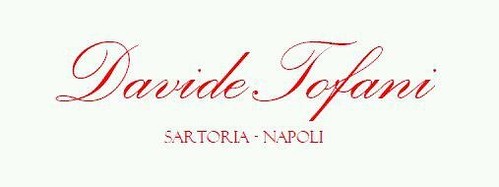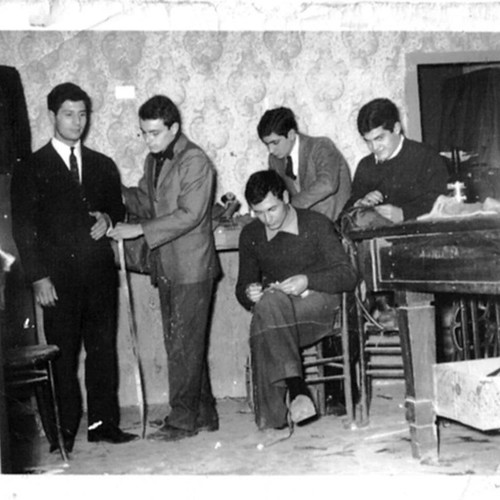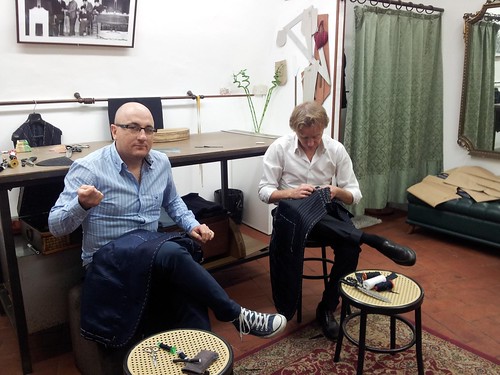


Naples, a Haven of Hand Work
NAPLES, Italy — In a basement room on a street where motor bikes and honking horns drown out even the insistent church bells, Davide Tofani is working on a typical Neapolitan soft jacket. “When I make a suit, it is like shaping a second skin of my customer,” the tailor says. “I cannot imagine making a suit without knowing the body that will use it.”
Over the last century, the personal tailor, working one to one with a client, has become as symbolic of Naples as its Roman sculptures and Baroque churches. Many men socializing with friends on the city streets or sitting on public benches wear elegant jackets, in tweed or linen, lightweight, unstructured — and indisputably tailor made.
And the Neapolitan tailors seem to be more successful than the chaotic city itself in moving further into the 21st century. Like the waters of the bay that rise and fall along the coastline, they have had good years and bad. But, today, the bespoke suit is back and doing well, even against the challenge of factory-made ready to wear.
The tailor Mariano Rubinacci, left, and his son Luca, the brand’s creative director, in Naples. Credit Rubinacci
To show that the tide of tailoring has turned, the big names in Naples have opened stores around the world. They also fly experts to their clients or offer them a home-away-from-home welcome in Italy.
Rubinacci is one of those names. The store here is above Via Chiaia in part of the historic Palazzo Cellamare, with its imposing staircase and history of lodging the artist Caravaggio. The tailors, who work by hand in rooms above the shop, have views of the vast stone building right down to the swell of the sea in the bay.
Mariano Rubinacci, sitting in the April sunshine on a bench in front of the store, looks like an old-school tailor in an impeccable jacket and one of the same smart ties on sale in the store beneath a picture of his father. Yet he and his family are constantly traveling. His son Luca is the brand’s creative director and he “is always in a plane from Kazakhstan to New York, Korea or Singapore,” Mr. Rubinacci said. His daughter Chiara complements her twin brother by running the seven-year-old store in Mount Street, London.
Mr. Rubinacci said he was proud that more than 20 of his 35 tailors are younger than 40. “I have my son. I have to build something for him,” the master tailor said.
Out of the city center, in the industrial area of Arzano, is the home of Kiton. The brand is recognized worldwide for its tailoring, created in a cluster of buildings linked by a glass corridor that displays formal pieces from the wardrobe of the duke of Windsor, the British king who abdicated for love.
Kiton was founded in 1956 by Ciro Paone, a fifth-generation fabric merchant who made a visionary move into tailoring, according to his nephew, Antonio De Matteis, now the company’s chief executive. Another nephew, Antonio Paone, is president and runs the business in the United States.
The Rubinacci store, in the Palazzo Cellamare in Naples. Credit Simon Crompton/Rubinacci Club
In the workers’ canteen, Mr. Paone, who uses a wheelchair as the result of a stroke, lunches with other working members of his family, including his daughter Raffaella and her cousins.
The company is housed in an elegant palazzo decorated with historic furniture and modern art bought to celebrate each profitable year. Behind these flourishes, attached to the back of the building, is the vast workshop for Kiton’s 350 tailors, who create front panels, backs, collars, pockets or lapels in the handwork factory. (A traditional bespoke tailor would make the entire jacket with his own hands.)
As with all these Neapolitan tailors, there is no computer in sight — although Mr. Tofani promotes his work via Facebook and Mr. Rubinacci keeps records online of his international clients. They once were entered in a ledger, dating from 1934, which is displayed in the Naples store so customers can peruse the orders of King Umberto II or Count Leonetti, a local nobleman. Today’s aristocrats are likely to be Russian oligarchs or Malaysian royals.
Mr. De Matteis said his “people factory” needs human hands more than high tech, though the Neapolitan work is complemented by a knitwear factory in Fidenza and one for sportswear in Parma. On the retail side, Kiton has 45 stores in Europe, the United States, the Middle East and across Asia, including Azerbaijan, Kazakhstan and China.
A new project is a Milan headquarters, in the palazzo on Via Pontaccio that the designer Gianfranco Ferré used before his death. This center will act as Kiton’s hub for international clients, where they can be measured for bespoke suits, buy accessories and, eventually, dine in a restaurant where fresh food will be driven in daily from Naples.
The Kiton team is constantly on the move, aiming to fly within 24 hours to a client anywhere in the world.
Davide Tofani at work in Naples: ‘‘I cannot imagine making a suit without knowing the body that will use it.’’ Credit Courtesy of Davide Tofani
Kiton trains its own new generations in a school adjacent to the factory. Each year its 12 students either join the company or find jobs elsewhere. Mr. De Matteis said that the goal is to have a young, newly trained tailor in every Kiton store across the world.
You do not have to be a billionaire to order a Kiton suit (unless it is in white vicuña). But it is mostly millionaires, some from Silicon Valley in California, who buy bespoke, at an average cost of 7,000 euros, or $9,670, for a typical suit, plus the trimmings, like hand-crafted neckties and shirts. A suit jacket takes 26 hours to make, and a shirt requires five hours. Shoes, too, are now made-to-order by Kiton.
The overall high quality for both bespoke and ready-made seems to satisfy consumers. When Mr. De Matteis arrived at the company in 1986 annual sales were €4 million; in 2010, sales hit €60 million, and last year they reached €105 million.
He said that bespoke starts from the premise that the client does not “need” a new suit — he has a closet full already. When he spends €100,000 or even €250,000, he is, instead, buying into the luxury of a truly personal experience.
“For a person who has everything, free time is most important and when he comes here he feels free,” Mr. De Matteis said. “Our philosophy is: Never put them under pressure. Let them feel that they come here for fun. If you are able to find this key to the final consumer, if you make it in the right way, they feel that they are part of the family.”
The last word on the philosophy of Neapolitan tailoring goes to Mr. Tofani. Now 47, he started to learn tailoring from his father when he was 13 and works with his brother Enea, who specializes in trousers. Together, they produce one suit a week, depending on the type and the customer’s demands.
“You have to understand that Neapolitan tailoring is an art and not a job,” said Mr. Tofani, who hopes that his own son will learn the family skill.
He added: “My father always said to me, ‘There is no reason to make a big store, but it’s important to be a great tailor in a small store.’ It would be a nightmare for me to think of making a big company. I don’t think about making a lot of money. I am an artist.”






Комментариев нет:
Отправить комментарий